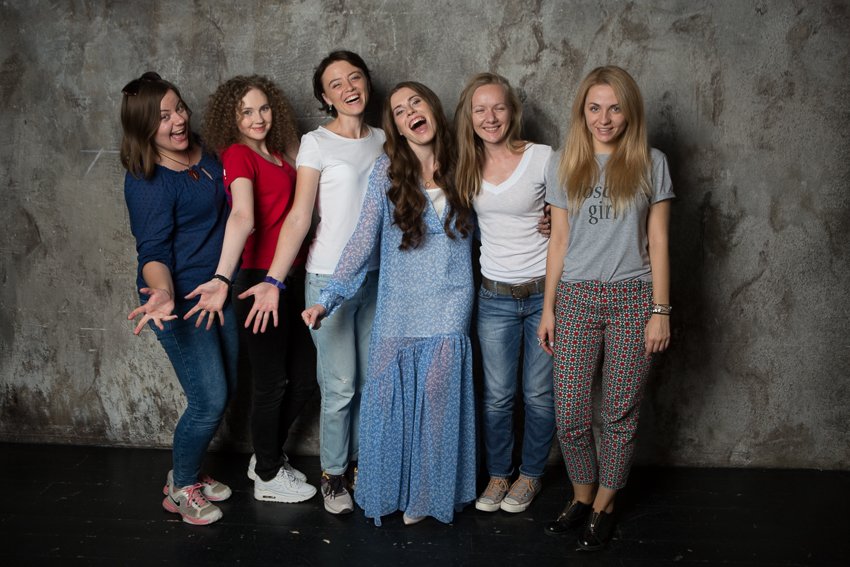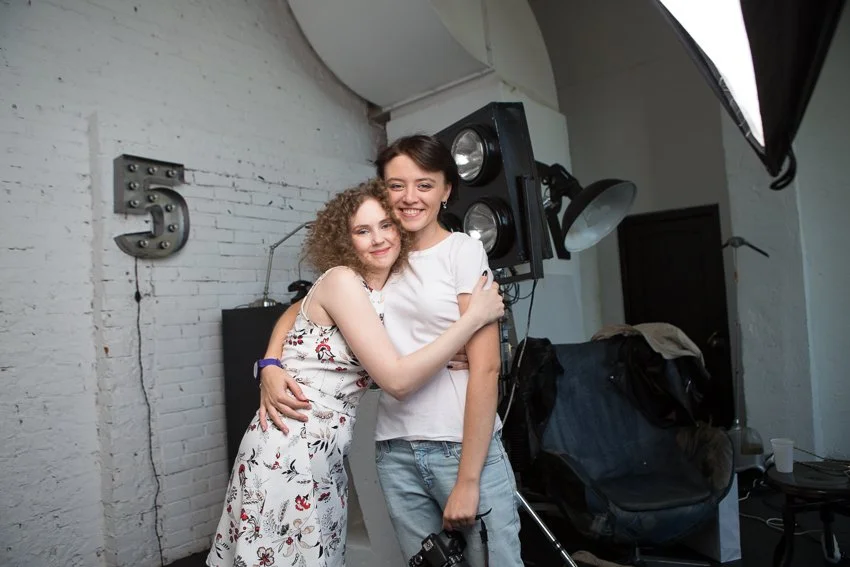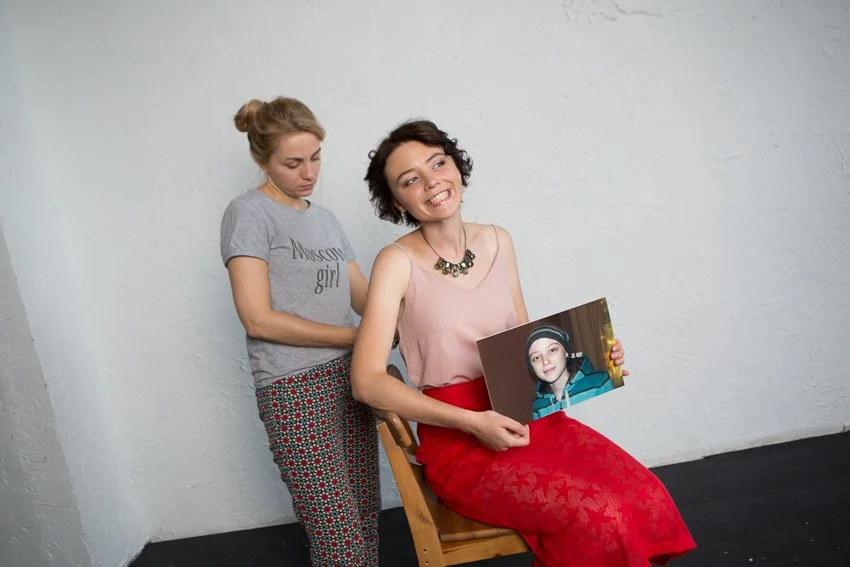A Life That Sparkles: From Patient to Charity employee
It’s been nearly ten years since Zhenya first fell ill. Since then, she has graduated with a degree in journalism, joined the staff of the Podari Zhizn Foundation, and conducted all the interviews for our anniversary calendar. Today, we share her story—her victories, her recollections… and her tears.
“At 15, at the end of Year 8, I was hospitalized at the Kaluga Regional Hospital with kidney inflammation. I was suffering from major edema—my legs, eyes, and arms were all swollen. After three weeks of treatment, I wasn’t getting any better. Of course, it turned out not to be a kidney issue at all—it was cancer. Oncology often hides behind the symptoms of other diseases.”
“My dad helped me a lot. He told me from the start: ‘You just have to keep putting one foot in front of the other. The most important thing is to keep moving forward, no matter how hard it gets.’”
“I’d expected the hospital ward to be quiet, gloomy… but it was full of life. Little bald kids raced down the corridors. Older children lounged on the sofas and chatted. My ward-mate Madina had already been there three months by the time I arrived. She prepared me for everything—explained what I’d experience when things got rough and when they’d be easier. She made me laugh so much. I was very lucky to meet people who knew more than I did.”
“The first two months were grueling. I lost 20 kilograms, going down to 38. I could hardly walk and cried all the time.”
Then, one day, as she was leaving the ward in a wheelchair, Zhenya realized:
“I’d reached my limit. I couldn’t get any weaker. I had to fight—to keep going with treatment and support my loved ones who were watching me go through it all.”
Soon she began to walk again, and to leave the ward. Her test results improved. Doctors began letting her spend time at home. That gave her new strength.
Life Outside the Ward
“Everything was getting better, but people’s reactions on the outside were unpredictable. I’d go down into the metro in a hat or headscarf, stick-thin, with a huge medical mask and burning eyes… I must’ve looked like an alien. Some people stared, some teared up, and some tried to help.”
“Once, a woman caught up to us and offered something to my mom. She said she didn’t have anything, but wanted to help. She gave us a rhinestone keychain for luck. It was very touching.”
“But there was another time a man asked, ‘It’s not the plague, is it?’ That hurt my mom more than it hurt me. I figured people were just scared and trying to protect themselves the only way they knew how.”
Finding Magic in the Struggle
“I tried to turn everything bad into something good—or at least something magical. One day I got sick on the metro and had to be carried on a stretcher. I imagined myself as an Oriental princess. That helped.”
“Time smooths out the bad memories. I don’t remember the hospital as a terrible place. It was part of my life, with joy, sorrow, friendship, and pain—just like any other part of life. Nothing in a person’s life passes without leaving a mark. And that goes double for a serious illness.”
“My tears now aren’t from fear or self-pity. They’re from the deep awareness that life is fragile—and beautiful. I don’t talk about this every day. But sometimes, I remember it all, to remind myself why I’m here.”
Returning to Life
Treatment lasted eight months. Zhenya went through six rounds of chemotherapy, followed by radiation. On December 30, she was discharged.
“I was overjoyed! I knew my dad and sister had prepared a surprise. They’d redecorated my room—new furniture, bright green walls, full of life. But more than anything, I was happy to be home again.”
“It had been easier for my mom—she was always with me. But my dad had to live alone during the week. He lost weight and had heart issues from the stress. My mom and I agreed not to tell him if I was feeling worse, just to protect him.”
After six months of homeschooling, she passed her exams and returned to school in 2010, graduating with top grades.
“But I was terrified about how my classmates would react. They had visited me in the hospital, but I hadn’t come out to see them—I looked awful and felt embarrassed.”
“I hadn’t written to anyone. I didn’t want to get too close in case something went wrong. I focused on treatment. But then they all came to see me—30 people! We had tea, talked about school, and they didn’t ask a single invasive question. It felt like life might return to normal.”
Rebuilding Identity
“Before the illness, I had a very active life—I performed at concerts as a drummer, went snowboarding. I really wanted that back.”
“For the first year, I had strict lifestyle and diet restrictions. Later, it was mostly my mom who tried to limit me. I fought back—I told her I wasn’t disabled, not a patient anymore. I couldn’t live as a prisoner of my diagnosis. Dad supported me.”
“Of course, I don’t blame her. Being the one who’s sick is easier. Watching someone you love suffer and not knowing how to help—that’s harder.”
A New Perspective
“I wanted my old life back, but it wasn’t that easy. In the hospital, your values change. I got annoyed when my friends talked about silly problems. I felt like an adult at 16, like I had wisdom they couldn’t understand.”
“But a year later, I was talking about the same things. That’s when I knew I was recovering—mentally, emotionally. I cared about more than just surviving. I started thinking about what to wear to the party.”
“Illness can make even a child grow up. My values changed—life, family, and friends became everything. I think I became stronger. But I don’t divide my life into ‘before’ and ‘after’ the illness. It’s all one life, and the illness was a test I had to face. Maybe it prepared me for things yet to come.”
Giving Back
While in university, Zhenya stayed in touch with the Foundation.
“When I was sick, the Foundation helped raise half a million rubles for my treatment. Volunteers visited us. I joined their photo project and even visited hospitals myself. So when I asked about working with them, it felt right.”
“They gave me a proper interview—no special treatment. I went through a four-month trial and was thrilled when I got hired. I’m happy and lucky to work here.”
“I want my work and my life to help the people around me. That’s what matters to me. But just like any girl, I also want to get married, have children… and for everything to be wonderful.”
A Final Memory
“One day, my mom saw a huge lymph node on my neck. Doctors removed it right away and sent me to intensive care. They realized they couldn’t treat me there, and my parents urgently searched for help in Moscow.”
“An ambulance brought me to the Russian Children’s Clinical Hospital, to the oncohematology ward. And I wasn’t scared anymore. I’d felt worse in Kaluga. There, I was being treated, but nothing helped. I just wanted to know what was wrong and how to fight it.”
“That’s why I’m grateful to the doctor who told me everything—honestly and clearly. I was diagnosed with stage IV Hodgkin’s lymphoma. Before chemo could begin, they had to stabilize my kidneys. For weeks, we waited. Then one day, the doctor burst into the room, glowing with joy: my test results had finally improved. We could begin.”
“And so we did.”




